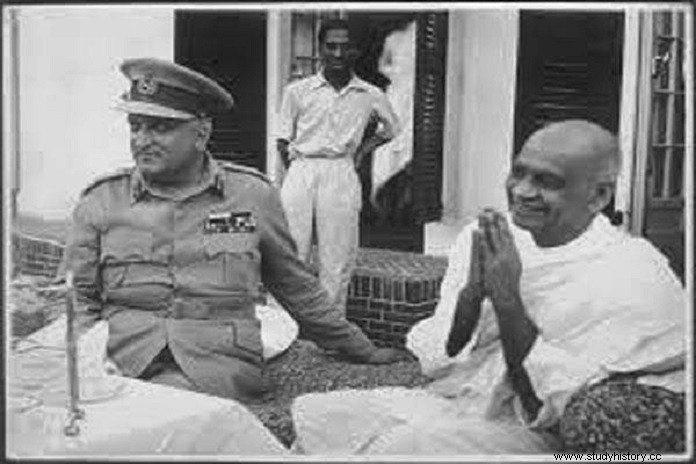
Kashmir was the only state in the country whose king was a Hindu but the majority of the people of the state were Muslim. In the geographical division of India by Radcliffe, Kashmir had the facility to meet India or Pakistan in any country, or remain completely separate. After India's independence, the Kashmir King Hari Singh decided to remain separate from India and Pakistan. Jinnah understood his natural right over Kashmir. There were three main reasons for this-
(1) The borders of Pakistan and Kashmir used to meet each other.
(2) Kashmir had more Muslim population than Hindus.
(3) Some rivers used to originate from Kashmir which entered Pakistan after flowing into India for some distance and they were going to prove to be the lifeline for Pakistan.
When Kashmir was not found in Pakistan and the King of Kashmir decided to remain separate from both India and Pakistan, on 22 October 1947, Pakistan invaded Kashmir from Pashtun tribesmen. The uniformed army of Pakistan was also sent with these tribals. This army came to Baramulla and started looting. Maharaja Harisingh sought help from the Government of India.
Sardar Patel expressed his desire to save Kashmir, but Nehru and Mountbatten opposed him saying that the Indian army should not be sent to Kashmir until the King of Kashmir expressed his desire to join India. On this, Patel, taking Defense Minister Baldev Singh into confidence to save Srinagar and Baramulla Pass, employed Indian security teams in Indian territories on the border of Kashmir in such a way that they could be sent to the war zone immediately. He also got the road constructed from Srinagar to Pathankot. Harisingh signed the Instrument of Accession to India when Pakistan's forces were left only 35 km from Srinagar.
Now Nehru and Mountbatten were compelled to send the Indian army to Kashmir, but Mountbatten believed that Kashmir should be merged with Pakistan due to being a Muslim-majority state and bordering Pakistan. Whereas Sardar Patel believed that Kashmir should be merged with India, being the kingdom of a Hindu king for centuries. Mountbatten advised Nehru to take the matter to the United Nations.
Sardar Patel opposed this proposal but Pandit Nehru came in the words of Mountbatten. Mountbatten and Nehru also wanted to take the Junagadh issue to the United Nations, but there too Sardar Vallabhbhai Patel and Sardar Baldev Singh had saved Junagadh by taking military action. A similar decision was taken in the case of Kashmir also.
In the capacity of Deputy Prime Minister, Sardar Patel, talking to Defense Minister Sardar Baldev Singh, entered the Indian Army in Kashmir via Gurdaspur in Punjab and landed Indian Air Force aircraft in Srinagar. On the other hand, on the advice of Mountbatten, Pt. Nehru took the matter to the United Nations. On 1 January 1948, India complained to the Security Council that Kashmir, a part of India, had been invaded by armed tribesmen and that Pakistan was providing aid to them both directly and indirectly.
This invasion has threatened international peace and order. Therefore, Pakistan should be asked to withdraw its army and not to give military aid to the tribals and this action of Pakistan should be considered as an attack on India.
On 15 January 1948, Pakistan rejected India's allegations and accused India of malpractice, saying that the accession of Jammu and Kashmir to India is unconstitutional and cannot be recognized. The Security Council constituted a five-nation committee to solve this problem and asked this committee to observe the situation on the spot and make a compromise.
The United Nations Committee came to Kashmir and inspected the spot and on 13 August 1948, several suggestions were made from both the sides to stop the war and compromise, on which there was a long discussion between the two sides. Finally, on 1 January 1949, both sides agreed to a ceasefire. It was also decided that the final decision would be taken through a plebiscite. For this, an American citizen Chester Nimitz was appointed as administrator, but Pakistan did not comply with the terms of the agreement and the referendum could not take place.
Nimitz resigned from his post. Nehru and Mountbatten badly complicated the problem of Kashmir by taking it to the United Nations. For this Sardar Patel got angry with Jawaharlal Nehru. Due to the wrong policies of Nehru, in 1962, China also suppressed a large part of Kashmir which is still in its possession. In 1965, there was a war once again between Pakistan and India over Kashmir and Pakistan suppressed a large part of Kashmir which is still under Pakistan's occupation.
When the Pakistan-charged war was going on in Kashmir, the Indian government stopped the transfer of the assets decided in the partition to Pakistan. 17.5 percent of the British-India properties were to be given to Pakistan. The cash was handled by the Reserve Bank of India and it stopped transfers amounting to Rs 75 crore for several months. On Gandhiji's pressure, the Nehru government had to give Rs 55 crores to Pakistan.
Pakistan did not get the rivers from the Kashmir war which it wanted to capture on the strength of bayonets, but due to the war in Kashmir, 165,000 tonnes of arms, ammunition and other defense material coming to Pakistan's part got stuck in India itself. Of this, India released only 4,730 tonnes till 31 March 1948 and then 18,000 tonnes by 10 September 1948. Pakistan claimed that till this date India owed Pakistan's share of munitions 1,42,000 tonnes.
